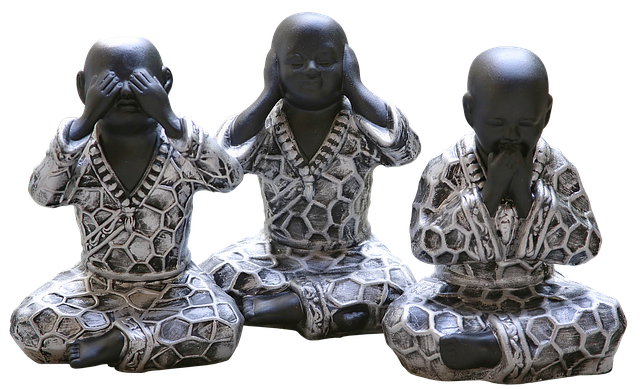🌟Buddhism: Karma and the Family - Part 3🌟

In Buddhism, there is some specific guidance for handling issues with family. However, this is mainly to answer questions that perplex those who have not developed the wisdom that would know how to automatically attend to these things that often come up in the family system. The previous essay Buddhism: Karma and the Family - Part 2 We took a closer look at the Six Perfections as the qualities that we aspire to while on the Noble Eightfold Path. It becomes obvious to one that takes the time to do the practice that more than likely within a very short time if we are sincere in our dedication to practice we won't have the mental real estate to entertain judgements of our family members. What wisdom gives us is clear seeing so that we can see what a situation is and we see what we may or may not do and with no confusion. The general teaching is this:
The basis of the family is emotion. Emotional connections make the family. But, emotion and love are different. Emotion means opposites feeling: like/dislike, good/bad, mine/yours. Love means there are no opposites–only giving, giving, giving–always giving.
Understanding is in our head; emotions are in the heart. Our center–the tantien–is just below the navel. If you keep all your energy there, then you can digest your understanding and your emotions. Emotions are then changed into great love and great compassion. Also, your understanding then becomes wisdom. So, when your center becomes strong you can control your feelings, your condition, and your situation. When these become clear, then our true job appears: help all beings. That’s the great bodhisattva way. ~Zen Master Seung Sahn, From a talk at the Seoul International Zen Center
However, this does not happen overnight. In western psychology when we look at family dynamics there is awareness of intergenerational issues that get handed down and families unconsciously act out from one generation to the next. In psychotherapy when family dynamics are revealed new ways of responding to family dynamics are explored and we learn how to set boundaries and express our needs in a healthy way. In Buddhism this is called being skillful and if we understand how aspiring to the perfections trains us up while we practice meditation to allow self to fall away all we are left with is a golden thread of being that literally transforms everything within and without. This is what the sutras or Buddhist scriptures gift us with. Let's finish looking at the last of the perfections or as called in the sutras the paramitas and this current list of paramitas come from Mahayana Buddhism. These paramitas are listed many times in different sutras and also in one of the most well known The Lotus Sutra. It's not really important to know the differences in all the traditions more important to understand they are all similar and all have tremendous value. Before we do let's see how far we have come and where we are going.

We explored the previous five in the last essay and now we are on Prajñā pāramitā : wisdom, insight:
- Dāna pāramitā: generosity, giving of oneself
- Śīla pāramitā : virtue, morality, discipline, proper conduct
- Kṣānti pāramitā : patience, tolerance, forbearance, acceptance, endurance
- Vīrya pāramitā : energy, diligence, vigor, effort
- Dhyāna pāramitā : one-pointed concentration, contemplation
- Prajñā pāramitā : wisdom, insight
Additionally there are for more that are fuel for our actions and they are are listed the Ten Stages Sutra:
- Upāya pāramitā: skillful means
- Praṇidhāna pāramitā: vow, resolution, aspiration, determination
- Bala pāramitā: spiritual power
- Jñāna pāramitā: knowledge
Prajñā pāramitā : wisdom, insight

Fuel For Action 1 ~ Upāya pāramitā: skillful means

An example of this is a parable of a rich man's burning house. His many sons were inside and he was outside starting to see his building burn. He knew his children were inside engrossed in playing games and were not listening. So, he made up a story about the favorite toys and playthings he knew they would want, he yelled at them to come out right away and see these things and thus saved their lives.
Fuel For Action 2 - Praṇidhāna pāramitā: vow, resolution, aspiration, determination
This perfection is simply the intention, with determination, and for some it would be to formally take the vow to commit to the Six Perfections. In a Buddhist community when one formally takes this vow they are supported by the community which is called a sangha and the community supports the person in their effort in this commitment. Whether it be with counsel from a monk or a small group that supports each other in their practice it is helpful to have others who are also committed to the perfections and to talk to when you are faced with decisions and situations that call for skillful means.

Fuel For Action 3 - Bala pāramitā: spiritual power
Spiritual powers are qualities of spirituality that negate or operate in balance to the common hindrances that try to arise when we are walking the Noble Eightfold Path. Thich Nhat Hanh teaches us that theses negative qualities can become habitual patterns so in developing the bala paramita or spiritual power we work to remove them. This is called Exegesis. Illustrating these balancing powers as follows:
Faith and Wisdom balance each other, as do Energy and Concentration. The Five Faculties are 'controlling' faculties because they control or master their opposites. The faculties and powers are two aspects of the same thing.
- Faith/Conviction (saddhā bala) - controls doubt
- Energy/Effort/Persistence (viriya bala) - controls laziness
- Mindfulness (sati bala) - controls heedlessness
- Concentration (samādhi bala) - controls distraction
- Wisdom/Discernment (paññā bala) - controls ignorance
We have a negative quality that predictably arises such as doubt and we can easily refer to our handy list to see the corresponding spiritual power. So doubt in family relationships can cause a lot of suffering. But sometimes the doubt is just there so we accept and work, accept and work. You can see how even as doubt can destroy doubt can be used as a vehicle for purification. Everything we use on our path to liberation and this is spiritual power.

Fuel For Action 4 - Jñāna pāramitā: knowledge
The final paramita that is our fuel for action is knowledge and this is the knowledge that is a reflection of ultimate reality. As an aspirant on the path to liberation Jñāna pāramitā does become quite involved in layers of subtlety. Within the context of family karma while living in accordance to the paramitas or perfections we understand once we have reached realization and this actual event is called jnana. Once we see the ultimate reality this informs all the rest of our lives. Unlike skillful means which is situational, jnana is ultimate knowledge. The opposite of jnana is ignorance. Ignorance in Buddhism is simply ignorance of the source of suffering which is perceiving through the veils of concepts. An example of this in family karma is that where we used to get hooked into family dramas we now understanding this is a result of ignorance and we no longer perpetuate these situations. We cultivate patience and wisdom and while we fulfill our responsibilities our we work towards enlightenment. As we saw in the previous essay this resolves a whole host of previous "problems." Problems stem from ignorance and are perpetuated by ignorance. Ultimate knowledge shows us that we all have the potential to remove the suffering caused by ignorance and by remaining steadfast on our path we model this for those in our family.
Conclusion

What do you think?
~

@soulsistashakti is a musical artist and writer based in NYC as well as a practitioner of Buddhist teachings. You can check out my music on my FB artist page at https://www.facebook.com/soulsistashakti
Images pixabay.com
Recent Posts
Meditation and Buddhism - The Fascinating and Awesome Power of Om Mani Padme Hum
The Magic of Flow and Why Hacks Are Bunk - Part 2
Buddhism: Trauma, Psychedelics and Meditation
Buddhism: What is Karma?
Buddhism: Karma and The Family - Part 1
Buddhism: What is Karma?
Buddhism: Karma and the Family - Part 2
Good post
Thought me key ways of managing a family
Emotions, love and others
Glad to hear that
Professional job 🔝🔝👌👌
Thank you
I think that small actions daily really add up to removing suffering! Great post!
That's how it works :)